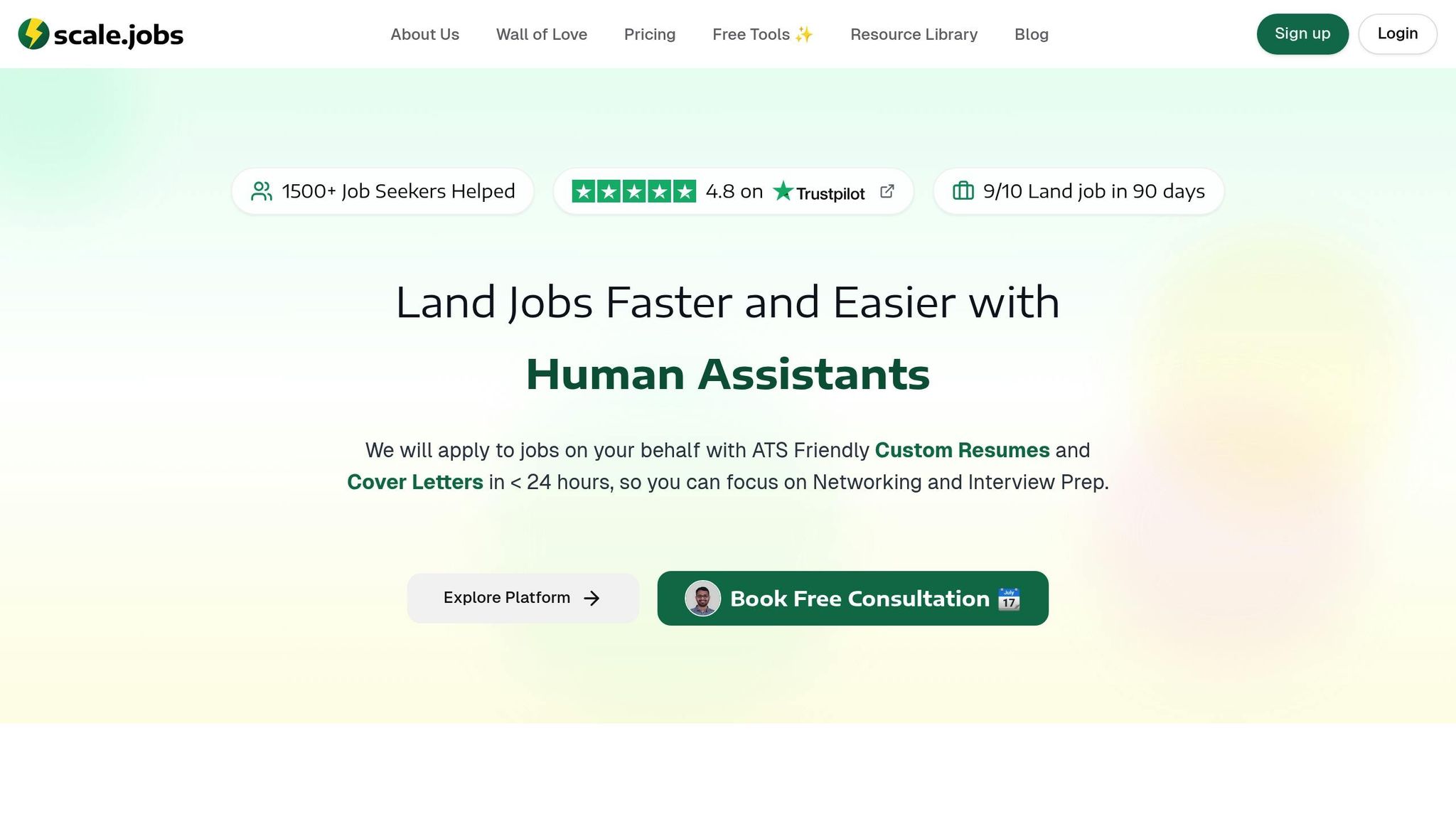5 Ways Emotional Intelligence Resolves Job Offer Conflicts
Learn how emotional intelligence can transform job offer negotiations by managing emotions, building trust, and fostering collaboration.

When negotiating a job offer, emotional intelligence (EQ) can make or break the outcome. It helps you manage your emotions, understand the employer’s perspective, build trust, and respond strategically to counteroffers. This article outlines five practical ways EQ transforms tense negotiations into productive conversations:
- Control Your Emotions: Stay composed during discussions to make better decisions under pressure.
- Understand the Employer’s Perspective: Recognize their constraints, like budget limits, to approach negotiations collaboratively.
- Build Trust: Use clear communication, active listening, and reliability to foster a positive relationship.
- Respond to Counteroffers Effectively: Focus on shared goals and present data-backed requests to keep the conversation constructive.
- Leverage Tools Like scale.jobs: Use platforms that save time and provide tailored support, enabling you to focus on EQ-driven strategies.
The Power of Emotional Intelligence in Negotiation - Chris Voss
What Is Emotional Intelligence in Negotiation
Emotional intelligence in negotiation is more than just keeping your cool during tough conversations. It’s a blend of five key components - self-awareness, self-regulation, empathy, social skills, and motivation - that together shape the outcome of any negotiation. These elements can mean the difference between closing a deal with confidence or walking away empty-handed.
Let’s start with self-awareness, the cornerstone of emotional intelligence. This is your ability to recognize your own emotions and understand how they might influence the negotiation. For example, if you feel frustrated after receiving a lowball offer, self-awareness helps you identify that emotion before it clouds your judgment.
"True self-awareness involves identifying your emotions in the moment and understanding the effect those emotions are having on the people around you." - The Black Swan Group
By acknowledging your feelings - perhaps by silently labeling them, like noting, "I’m frustrated right now" - you can regain focus and adjust your approach before emotions take over.
Next is self-regulation, which keeps you steady under pressure. This skill ensures you don’t react impulsively when faced with an unexpected counteroffer. Instead of snapping back or becoming defensive, self-regulation allows you to pause, think, and respond strategically.
"Remaining composed under pressure is what sets elite negotiators apart. Emotional outbursts or defensive reactions can quickly derail discussions, eroding trust and leverage." - Aligned
Once your emotions are in check, empathy allows you to see the situation from the other side. It helps you understand the hiring manager’s constraints - whether they’re dealing with budget limits or company policies. This perspective shifts the negotiation from a tug-of-war to a collaborative problem-solving process, where both sides can work toward a solution.
Social skills are the glue that holds the conversation together. They include your ability to communicate clearly, build rapport, and handle the interpersonal dynamics of the negotiation. These skills help you frame your requests in ways that resonate with the other party, ensuring the conversation remains productive even when tensions rise.
Finally, motivation in this context is about striving for outcomes that benefit both sides. It’s not about "winning" the negotiation but rather about creating a foundation for a positive, long-term working relationship. Staying focused on mutual gains helps you avoid short-sighted decisions that could harm future collaborations.
The importance of these skills becomes evident when you consider the research. A study in Switzerland found that traditional IQ had little impact on negotiation outcomes. Instead, participants who excelled in recognizing and understanding emotions achieved far better results, securing higher joint gains in exercises. Those with strong emotion recognition skills were particularly effective at creating mutual benefits.
This challenges the idea that analytical thinking alone drives negotiation success. While preparation and logic are essential, the ability to manage emotions - both yours and the other person’s - often plays a bigger role in sealing the deal.
For instance, if a hiring manager hesitates at your salary request, emotional intelligence helps you decode their reaction. Are they constrained by budget? Questioning your experience? Surprised by the number? Each scenario calls for a tailored response, and EQ equips you to handle these subtleties with finesse.
These five components work together seamlessly. Self-awareness alerts you to rising frustration, self-regulation keeps impulsive reactions in check, empathy helps you understand the employer’s perspective, social skills ensure clear communication, and motivation keeps you focused on a win-win outcome. Together, they empower you to navigate the complexities of job offer negotiations, where every move matters.
1. Control Your Emotions During Negotiations
Getting that job offer call can feel like an emotional rollercoaster. Maybe the salary isn't what you expected, or the benefits fall short. It’s tempting to react on the spot - whether it’s saying "yes" out of relief or turning it down out of frustration. But here’s the thing: keeping your emotions in check is one of your most powerful tools in a negotiation.
Studies show that leaders who manage their emotions effectively are 30% more likely to make sound decisions under pressure. Yet, a surprising 62% admit they struggle to stay calm during critical moments. In negotiations, your ability to regulate emotions can make all the difference.
Self-awareness is your first line of defense. It’s about identifying emotional triggers before they take over. Common triggers? Fear of rejection, feeling rushed to decide, bad experiences with past employers, or financial stress. By understanding what sets you off, you can prepare and stay grounded.
Your body often gives you clues when emotions are running high. A racing heart, tight chest, shallow breathing, or that knot in your stomach - these are signs that your emotions might be taking the wheel. Catch these signals early to stay in control.
One technique that works well is the "Notice, Name, and Navigate" approach. Here's how it works:
- Notice where the emotion shows up in your body. Maybe it’s tension in your shoulders or a flutter in your chest.
- Name the emotion clearly. For instance, "I’m feeling anxious about this offer", or "I’m frustrated by their lack of flexibility."
- Navigate by choosing how to respond thoughtfully, instead of reacting on impulse.
This pause creates space between what’s happening and how you handle it. For example, instead of blurting out, "This offer is too low", you might say, "Thank you for the offer. I’d like to take some time to review it and get back to you tomorrow." This gives you time to process and respond strategically.
After the negotiation, take a moment to reflect. What emotions came up? What triggered them? Noticing patterns can help you prepare for future discussions and improve how you handle similar situations.
During the negotiation itself, focus on your breathing. When emotions start to spike, take three slow, deep breaths before responding. This simple technique helps calm your mind and keeps you composed - without anyone else noticing.
Keep in mind, the hiring manager is likely juggling their own emotions, too. They might feel pressured by budget constraints, anxious about making the right hire, or frustrated by company policies. By staying calm, you make it easier for them to do the same, which can lead to more productive conversations.
The goal isn’t to shut down your emotions completely. They’re valuable - they signal what’s important to you. The trick is to manage them so they guide, rather than control, your decisions. When you stay composed while discussing salary, benefits, or timelines, you show the kind of emotional intelligence employers value. This skill not only strengthens your negotiation but also sets the tone for understanding the employer’s perspective in the next step.
2. Understand the Employer's Perspective
Once you've got a handle on your own emotions, the next step is to take a closer look at the challenges employers face. It's not just about your needs - hiring managers have their own set of pressures and limitations that shape the negotiation process.
Employers often operate within strict boundaries, like budget restrictions, company policies, and the need to maintain fairness across the team. For example, budget caps are typically set months in advance by executives who’ve never met you. Even if a hiring manager wants to stretch those limits, they’re often tied up in red tape, requiring multiple layers of approval.
"Know that there will be constraints that the hiring manager has to work with. Budget caps, company policies, and internal equity considerations can affect what's possible." – IQ PARTNERS
Recognizing these constraints doesn’t mean you should settle for less than you're worth. Instead, it helps you approach the conversation with empathy rather than frustration. Employers are focused on balancing their investment in you with the value you bring to the company. As Colin, a former recruiter and CEO, puts it:
"They care about offering you the minimum number you will (somewhat happily) accept, because $20k saved today is easily $100k+ saved over 3 years when you factor in payroll taxes, salary-based bonuses, and raises."
This insight can shift your approach from making demands to proving your value. When you understand the employer’s perspective, you might uncover opportunities you hadn’t considered. For instance, if they can’t adjust the base salary, they might offer perks like professional development funds, flexible work hours, or a signing bonus. By being empathetic, you open the door to creative solutions that benefit both you and the employer.
"Understand what the employer can and cannot change. Some elements like salary caps might be non-negotiable, while others like start dates or bonuses might be more flexible." – Prospect Rock Partners
Pay close attention to the language hiring managers use during negotiations. Statements like "I'll need to check with my manager" or "Our budget for this role is pretty tight" often reflect real constraints. Acknowledging these signals instead of pushing back aggressively can build trust and pave the way for collaborative problem-solving.
Taking this empathetic approach not only helps you navigate the negotiation process but also turns what could be a tense discussion into a constructive one. It’s about finding solutions together, rather than working against each other.
3. Build Trust for Better Negotiations
Understanding an employer's limitations is just the beginning - building trust is the key to turning a negotiation into a productive conversation. Trust fosters collaboration, shifting the dynamic from a back-and-forth struggle to a discussion where both sides work together to find solutions that benefit everyone.
The first step in establishing trust is clear and honest communication. Avoid treating the negotiation like a game of strategy. Be upfront about what matters most to you. For instance, if achieving a better work-life balance is more important than a higher salary, say so. If you’re thrilled about the role but need a specific start date, explain why. This level of openness often encourages the employer to respond with the same level of honesty, creating a more transparent and productive dialogue.
Another essential element is active listening. When the hiring manager shares information - like budget constraints or team dynamics - acknowledge their concerns before presenting your own. Simple phrases like, "I understand the budget limitations you're working with" or "That makes sense given the team structure" show that you’re paying attention and value their perspective. This not only builds rapport but also demonstrates respect for their position.
Body language matters just as much as words. Maintain eye contact and keep an open posture to signal that you’re engaged and collaborative, rather than defensive or confrontational.
Strategic timing can further strengthen trust. Before diving into your requests, take a moment to express gratitude. For example, you might say, "Thank you for the offer - I'm really excited about this opportunity," before discussing your needs. This approach shows that you’re genuinely interested in the role and not solely focused on negotiating terms.
Reliability is another cornerstone of trust. If you commit to sending references by Friday, aim to deliver them by Thursday. If you promise to review the offer over the weekend, provide your response when you said you would. These small but meaningful actions demonstrate your professionalism and reliability, setting the tone for a positive working relationship.
When disagreements arise, frame them as shared challenges rather than confrontations. For instance, instead of saying, "Your salary offer is too low," try, "Let’s explore ways to bridge the gap between the offer and my expectations." This kind of language invites problem-solving rather than creating tension.
The benefits of building trust go beyond just securing a better offer. Employers are more likely to go the extra mile for candidates they trust - whether that means offering additional perks, restructuring a compensation package, or finding creative solutions to meet your needs. Even more importantly, starting your new role on a foundation of mutual respect lays the groundwork for a strong and successful relationship with your future team.
4. Respond to Counteroffers with Clear Communication
When counteroffers come into play, clear and thoughtful communication becomes essential. If an employer presents a counteroffer that doesn’t quite meet your expectations, how you handle the situation can make or break the negotiation. While it’s normal to feel disappointed or frustrated, staying composed and managing your emotions effectively is key to keeping the conversation productive.
Rather than viewing a lower-than-expected counteroffer as a rejection of your worth, try to see it as a window into the employer’s constraints. This perspective allows you to respond thoughtfully instead of reacting impulsively, keeping the door open for further discussion.
Start by acknowledging the positive aspects of the counteroffer. Highlighting elements like strong benefits or growth potential shows that you’re evaluating the entire package, not just focusing on what’s lacking. This balanced approach demonstrates professionalism and keeps the tone constructive.
Once you’ve recognized the positives, shift the discussion to areas that need adjustment. Frame your concerns around shared goals rather than personal demands. For instance, instead of saying the salary doesn’t match your experience, you could discuss how the compensation can better reflect the value you bring to the company. This collaborative language encourages problem-solving and mutual understanding.
Backing up your requests with concrete examples and market data strengthens your case. For example, if you’re asking for a higher salary, point to specific achievements, like leading initiatives that improved efficiency, and reference industry benchmarks to propose a figure that aligns with your contributions. This method keeps the conversation grounded in facts, not emotions.
Take your time to process the counteroffer - whether it’s a few hours or overnight. Letting the employer know that you’ve carefully reviewed their proposal signals thoughtfulness and respect. When you respond, focus on prioritizing your key concerns rather than overwhelming them with a laundry list of issues. Identify the most critical areas for discussion and present clear, constructive suggestions for improvement. This approach keeps the negotiation organized and forward-moving.
Flexibility is another important aspect of emotional intelligence during negotiations. If the employer can’t meet your salary expectations, explore alternative forms of compensation. Options like additional vacation days, flexible work arrangements, or an earlier performance review with the potential for a raise can be effective solutions. Demonstrating a willingness to find creative alternatives not only shows maturity but also makes you a more collaborative partner in the process.
The ultimate goal isn’t to win every point but to reach an agreement that feels fair to both sides. This may mean compromising on some requests while finding innovative solutions for others. By maintaining a collaborative tone and focusing on shared success, you’re more likely to reach a positive outcome while preserving the strong relationship you’ve built throughout the negotiation.
5. Use Tools Like scale.jobs to Support EQ-Driven Negotiations

Emotional intelligence is at the heart of successful negotiations, but having the right tools can make applying these skills much more effective. Take scale.jobs, for example. Unlike platforms like findmyprofession.com that focus on specific aspects of the job search, scale.jobs combines AI-driven solutions with human support to simplify the job-hunting process. This allows you to focus on what really matters during negotiations - building meaningful relationships.
By automating tedious tasks like formatting resumes, tracking applications, and managing multiple submissions, platforms like scale.jobs free up your time for more strategic efforts. Imagine saving over 20 hours a week on these logistics. That extra time can be spent researching company cultures, preparing for discussions, and honing emotional intelligence strategies like self-regulation and empathy - all of which are critical for successful negotiations.
One standout feature is the AI-powered resume and cover letter customization. It ensures your application materials are tailored to each opportunity, giving you a confidence boost when it’s time to negotiate. With these administrative tasks handled, you can focus on clear and empathetic communication, a cornerstone of effective emotional intelligence.
Another benefit is the human assistant services offered by scale.jobs. These professionals provide objective guidance during emotionally charged moments, such as when a counteroffer doesn’t meet your expectations. Instead of reacting impulsively, you can rely on their support to process the situation calmly. They also help by researching industry standards and company constraints, offering insights that help you better understand the employer’s perspective - an essential component of emotional intelligence.
For recent graduates or immigrants navigating visa complexities, this type of support becomes even more critical. With scale.jobs managing technical hurdles like ATS systems and application portals, you can concentrate on developing cultural awareness and sharpening communication skills - both of which are vital for navigating the U.S. job market.
| Negotiation Challenge | How scale.jobs Helps | EQ Benefit |
|---|---|---|
| Time pressure affecting decision-making | Automates the application process, saving 20+ hours weekly | Allows thoughtful preparation and reflection |
| Stress from managing multiple offers | Centralized tracking and professional human support | Improves emotional regulation and clarity |
| Limited insight into employer expectations | Research and contextual insights from human assistants | Enhances understanding of employer needs |
| Uncertainty during negotiations | Real-time WhatsApp updates and proof-of-work transparency | Promotes a calm and focused mindset |
Comparison Table
Scale.jobs combines personalized human support, ATS-friendly documentation, and seamless communication to make EQ-focused negotiations more effective. Here's a breakdown of the standout features that differentiate scale.jobs from traditional platforms:
| Feature | scale.jobs |
|---|---|
| Human Assistant Support | Real-time updates and proof-of-work reports provided by expert assistants directly via WhatsApp. |
| ATS-Optimized Documentation | Resumes and cover letters tailored with AI to meet applicant tracking system (ATS) requirements. |
| Real-Time Communication | Round-the-clock WhatsApp updates and detailed progress reports for informed, stress-free decisions. |
| Expert Negotiation Guidance | Strategic advice to refine and strengthen your negotiation tactics. |
| Transparent Pricing | Flat, one-time fees ranging from $199 to $1,099 with no hidden costs. |
| Time Savings | Reclaim over 20 hours weekly to focus on networking and preparing for interviews. |
| Workflow Transparency | Time-stamped progress updates eliminate guesswork and keep you focused during negotiations. |
Conclusion
Navigating job negotiations successfully hinges on five key strategies: managing your emotions, seeing things from the employer's perspective, establishing trust, communicating clearly, and utilizing modern tools. Together, these approaches create a foundation for achieving outcomes that benefit everyone involved.
Studies consistently highlight a strong link between emotional intelligence and successful negotiation results. A high EQ helps you achieve agreements that satisfy both sides, build lasting professional connections, and maintain confidence during discussions. These strategies aren't just practical - they're backed by evidence showing they lead to better negotiation experiences.
Platforms like scale.jobs enhance EQ-driven negotiations by saving time and strengthening professional relationships. With tools like AI-powered resume optimization, real-time WhatsApp support, and transparent workflow management, scale.jobs equips you to handle even the toughest negotiation scenarios. By blending emotional intelligence with advanced tools, you can consistently navigate negotiations with confidence and success.
Focusing on emotional intelligence and leveraging smart tools offers long-term career advantages. You’ll free up time for networking and interview prep while building a reputation for professionalism and collaboration. In today’s competitive job market, combining human insight with technology isn’t just helpful - it’s a game-changer for achieving the career growth you’re aiming for.
FAQs
How can I use emotional intelligence to navigate a job offer that falls short of my expectations?
Emotional intelligence can play a key role when you're faced with a job offer that doesn’t quite meet your expectations. It helps you keep your composure, manage your emotions, and tackle the negotiation process with a mix of empathy and professionalism. By genuinely listening to the employer’s point of view and thoughtfully sharing your concerns, you can create an atmosphere of mutual respect and trust.
Approaching the conversation with emotional intelligence allows you to clearly express your needs while keeping the tone respectful. This strategy not only improves the chances of reaching a compromise that works for both sides but also leaves a lasting positive impression. It’s not just about improving the offer - it’s about maintaining a strong relationship that could open doors down the road.
How can I build trust with a potential employer during job offer negotiations?
Building trust during job offer negotiations hinges on honesty and active listening. Clearly outline what matters most to you while genuinely considering the employer's perspective. This approach shows understanding and helps create a cooperative environment.
Do your homework - research the company and the role thoroughly - and stay open to finding solutions that work for both sides. Following through on your promises and staying professional throughout the process can strengthen trust even further. By prioritizing shared objectives and keeping communication clear and open, you can foster a respectful and productive negotiation experience.
How can scale.jobs help job seekers use emotional intelligence during job offer negotiations?
Scale.jobs provides job seekers with the tools and support they need to use emotional intelligence (EI) effectively during job offer negotiations. Emotional intelligence plays a crucial role in managing emotions, building trust, and creating understanding - key factors for successful negotiations.
With features like AI-assisted personalized responses, expert virtual assistants, and real-time WhatsApp updates, Scale.jobs ensures users stay composed, organized, and empathetic throughout the process. These resources empower job seekers to present themselves with confidence, navigate complex conversations with care, and work toward outcomes that benefit both parties.




